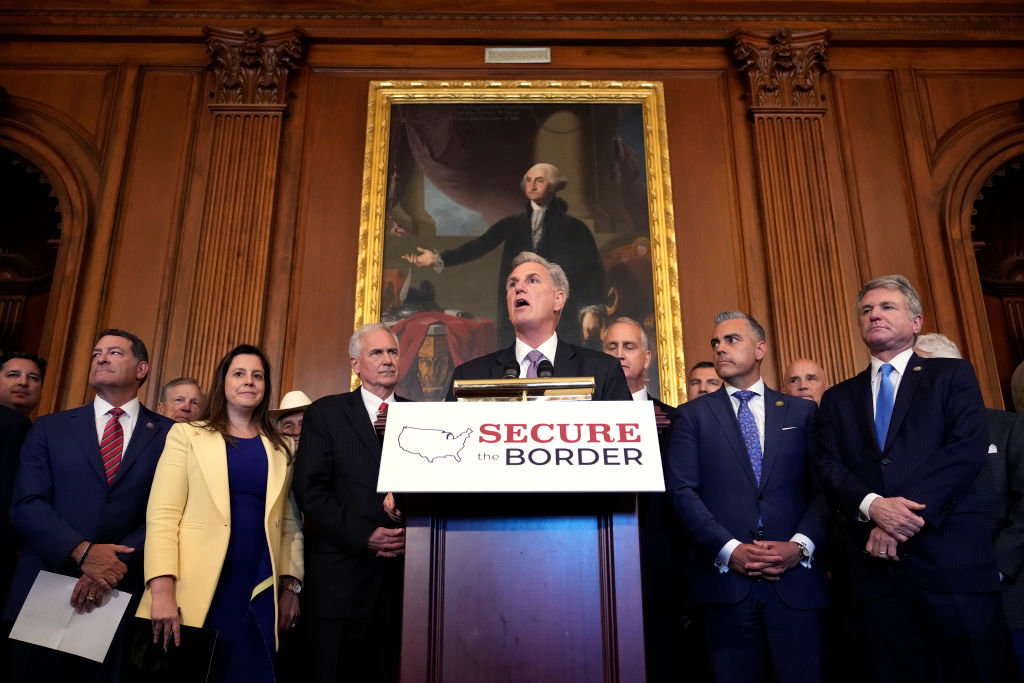Republicans on Thursday passed their Secure the Border Act, an expansive 213-page immigration package that codified much of former President Donald Trump’s policies to limit immigration. But last-minute uncertainty again showed party leaders’ challenge in managing their slim majority as debt ceiling deadline and high-profile government spending talks loom.
The border bill cleared the chamber by a 219-213 vote. All Democrats voted against the measure, while two Republicans also defected: Reps. Thomas Massie of Kentucky and John Duarte of California. The bill would fund restarting construction on a physical border wall along the U.S.-Mexico border, beef up surveillance and technology at ports of entry, codify the “Remain in Mexico” policy, and implement employment eligibility verification, among other changes.
The vote coincided Thursday with the Biden administration allowing the expiration of Title 42, pandemic-era border restrictions that had been key to allowing the administration to manage the flow of migration at the U.S.-Mexico border. The Trump administration first wielded Title 42 to turn back migrants without hearing their asylum claims, a policy the Biden administration continued to some Democrats’ chagrin.
The House GOP conference was almost entirely unified behind their bill, but the route to passage was anything but straightforward. The vote came after months of delay and suspense in the 48 hours prior to its floor consideration: Republican Rep. George Santos got arrested, complicating the numbers for leadership, and a slew of policy complaints from other Republicans threatened to derail the effort.
The challenges didn’t stop House Speaker Kevin McCarthy from taking a victory lap on Thursday after passage. “A few moments ago House Republicans passed the strongest border security bill this country has ever seen,” he said after the bill advanced. He slammed the Biden administration for producing “no plan” and “bumbling into another crisis.”
Concerns began bubbling up Tuesday evening, when the Rules Committee met to finalize the package ahead of reporting it for a full floor vote.
“You know, as usual, we’re still having a few little last-minute kinds of checks and seeing where everybody is,” Rep. Chip Roy, a Texas Republican, told The Dispatch during a brief break in the Rules Committee meeting Tuesday. “These are tough issues.”
“We’ve got an overall consensus that we need to get this done,” Roy added. Over a few months, “we’ve just worked constantly to tweak and improve it and get it to a place where I think everybody agrees.”
That meeting ended after midnight Wednesday, when more challenges arose.
A few lawmakers from agricultural districts raised concerns about the package’s planned expansion of E-Verify, an optional federal program that allows employers to electronically verify whether someone is legally authorized to work in the country. The bill would have required all employers to use E-Verify. Reps. Mike Simpson of Idaho, David Valadao of California, and Dan Newhouse of Washington, among others, worried mandating the program would harm the agriculture industry, which relies heavily on immigrant labor.
GOP leadership cut a deal to include language that the Department of Homeland Security would consider and address “any adverse impact” on the industry’s workforce when implementing E-Verify requirements. Leaders also assured lawmakers they would further negotiate that aspect of the package with the Senate before anything goes to President Joe Biden’s desk. (The broader bill has no chance in the Democratic-controlled Senate, and the odds of a bipartisan immigration package passing this Congress are low. The White House has said Biden would veto the House GOP legislation.)
On Wednesday, Valadao said he would support the bill, citing leadership’s assurances on E-Verify. But some holdouts remained.
“E-verify is a federal bureaucracy between you and your right to work for a living,” Rep. Thomas Massie of Kentucky said. He ultimately voted against the bill Thursday.
Another area of contention among other lawmakers was a part of the bill that would designate Mexican cartels as foreign terrorist organizations. Some Republicans pushed back, saying the change would further validate asylum claims from migrants fleeing violence—which could lead to more people being granted asylum in the United States.
Holdout lawmakers had meetings Wednesday with House Majority Whip Tom Emmer over the concerns. They brokered a deal that changed language in the bill to instead call for a congressional commission to report on whether cartels should merit foreign terrorist organization designation.
But the changes didn’t satisfy every lawmaker. Texas Republican Rep. Tony Gonzales, who supports designating cartels as foreign terrorist organizations, tweeted a video showing gunfire along the Texas-Mexico border. “Washington politicians fight to water down my portion of the border security bill that labels cartels as TERRORIST,” he wrote. But he ultimately supported the bill.
Duarte, who campaigned in part on his experience as a farmer, chalked his no vote up to concerns it would “harm many families that work in our Valley and create difficulties for our food producers.” Duarte Nurseries farms almonds, pistachios, and grapes.
Rep. Mario Díaz-Balart, a Florida Republican and sponsor of the immigration package, contrasted Republicans’ approach with the way former House Speaker Nancy Pelosi kept a tight ship with her Democratic majority last Congress, saying that trillion-dollar bills would go to the floor without the opportunity to offer changes and amendments.
“It just went from Nancy Pelosi’s imagination to the floor,” he told The Dispatch.
In contrast, he said, Republicans gave members opportunities to shape the bill by returning to regular order: “Three committees, with amendments, with debates. So it’s a big, big difference.” The bill was considered by the Judiciary, Homeland Security, and Foreign Affairs committees but didn’t feature an open amendments process on the full House floor.
Following the vote, lawmakers who chaired the three committees that shepherded the package—Reps. Jim Jordan, Mark Green, and Michael McCaul—released a joint statement celebrating its passage.
Others took victory laps in the wake of passage.
“My Democratic colleagues are bat crap crazy when it comes to the border so you know, we just gotta go it alone because apparently Republicans are the only ones who give a crap about, you know, sovereignty, security,” Roy told The Dispatch after exiting the chamber.
“I think we got a good package,” he added. “We’re gonna rally around it and kick it over to the Senate, the president—and make him, you know—choke on that like the debt ceiling bill.”






Please note that we at The Dispatch hold ourselves, our work, and our commenters to a higher standard than other places on the internet. We welcome comments that foster genuine debate or discussion—including comments critical of us or our work—but responses that include ad hominem attacks on fellow Dispatch members or are intended to stoke fear and anger may be moderated.
With your membership, you only have the ability to comment on The Morning Dispatch articles. Consider upgrading to join the conversation everywhere.